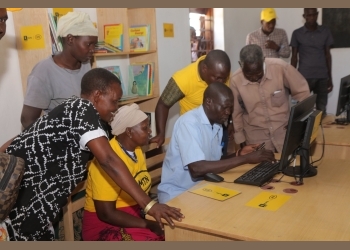
Finding a job after university graduation presents a unique set of options and challenges that can shape the early stages of a graduate's career. Navigating this landscape requires understanding the benefits and potential hurdles that come with this pivotal transition. Read this article to raise your odds of getting a job and playing your bets in Ghana
THE OPTIONS
Diverse Opportunities: Graduates today have access to a wide range of industries and roles. The increasing number of startups, coupled with the growth in sectors like technology, healthcare, and renewable energy, presents a wealth of opportunities.
Global Job Market: The globalized job market allows graduates to seek employment beyond their home country. This international exposure can enhance professional development and cultural understanding.
Higher Education and Specialization: Graduates can opt for further education like master's degrees or professional certifications. This can be a strategic move to specialize in a particular field or pivot to a new area of interest.
Networking and Digital Platforms: The rise of professional networking platforms like LinkedIn has made it easier for graduates to connect with potential employers, alumni, and industry leaders, expanding their job search reach.
CHALLENGES FOR GRADUATES
Competition: One of the biggest challenges is the high level of competition. Many graduates, often with similar qualifications, are vying for the same positions, making it crucial to stand out.
Experience Requirements: Many roles, even at entry level, require some form of experience. This can be a catch-22 for new graduates who have focused primarily on their studies.
Economic Fluctuations: The job market is often influenced by economic conditions. Recessions, pandemics, or industry downturns can significantly reduce job opportunities.
Skill Gap: There's often a mismatch between the skills taught in universities and the skills demanded by employers. Keeping up with industry trends and acquiring relevant skills is essential.
Mental Health and Stress: The pressure to find a job can take a toll on mental health. Graduates often face stress and uncertainty during this period, which can be challenging to manage.
NAVIGATING THE PATH FORWARD
To successfully navigate these options and challenges, graduates should:
- Leverage Internships and Work Placements: These can provide valuable experience and a foot in the door.
- Develop Soft Skills: Communication, teamwork, and problem-solving are highly valued by employers.
- Stay Informed and Flexible: Keeping abreast of industry trends and being open to various roles can widen job prospects.
- Seek Mentorship and Guidance: Engaging with mentors or career advisors can provide insights and advice.
THE STAR METHOD: WHAT YOU SHOULD KNOW
Preparing for an interview can be daunting, but the STAR method is a reliable approach to help you articulate your experiences effectively. STAR stands for Situation, Task, Action, and Result, a technique designed to help job candidates provide concrete examples and narratives during an interview.
UNDERSTANDING THE STAR METHOD
- Situation: Describe a specific situation or challenge you faced. This should be a real-life example from your past work experience. Be detailed enough to paint a picture but focused enough to keep it concise.
- Task: Explain the task or responsibility you were given in that situation. What were your roles or objectives?
- Action: Detail the actions you took to address the situation. Highlight your skills and abilities, focusing on what you did, how you did it, and why.
- Result: Share the outcome of your actions. Emphasize the positive impact and what you learned. If possible, quantify the results with data or specific achievements.
STAR PREPARE FOR THE INTERVIEW
- Reflect on Your Experiences: Before the interview, reflect on your previous job roles and identify situations where you demonstrated key skills. Think about the challenges you faced, the tasks you managed, and how you contributed to your team or project.
- Choose Relevant Examples: Tailor your examples to fit the job you’re applying for. Review the job description and note the skills and competencies required. Choose examples from your past that align with these.
- Practice Your Responses: Use the STAR format to structure your answers. Practice speaking them out loud to ensure they are clear and concise. Remember to focus on what you did, the action you took, and the result of your action.
- Be Specific and Quantifiable: When detailing your actions and results, be as specific as possible. Use numbers and data to quantify your achievements, as they make your story more compelling and credible.
- Keep It Personal: Focus on your role in the example. Use 'I' instead of 'we' to emphasize your contributions.
- Prepare a Variety of Examples: Have a few different stories ready, as interviewers may ask several behavioral questions. This preparation ensures you're not repeating the same story.
- Adaptability: Be ready to adapt your examples to different questions. The same situation can often demonstrate various skills or qualities.
- Reflect on Failures Too: Sometimes, interviewers ask about failures or challenges. Use these questions to demonstrate your ability to learn and grow from experiences.
- Stay Positive: Even when discussing challenges or failures, maintain a positive tone. Focus on your learning and how the experience contributed to your professional growth.
- Practice Active Listening: During the interview, listen carefully to each question. This will help you choose the most relevant STAR story to tell.











